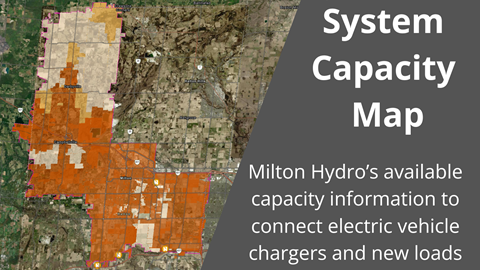
Electric Vehicle Charging
EV adoption is part of our grid transformation strategy as Ontario transitions away from fossil fuels and towards clean electric power. Whether at home, at work, or in public settings, electric vehicle charging requires added resources from the electric power distribution system. For this reason, it’s important to contact Milton Hydro prior to investing in electric vehicle (EV) supply equipment (EVSE) to review opportunities to connect your EVSE.
Customers interested in installing are welcomed to contact Milton Hydro’s engineering department for an early consultation. Please complete the Electric Vehicle Consultation Information Request (EVCIR) form and email it to Engineering@miltonhydro.com. Within 15 days, a representative from Milton Hydro’s Engineering Department will contact you about your EVCS project, opportunities to connect, and provide a report.
Curious about the available electrical load capacity in neighborhoods throughout the Milton Hydro service area? Check out our Capacity Map.

Electric Vehicle Charging Rate
If you own or operate a commercial electric vehicle (EV) charging station, you may be eligible for the new Electric Vehicle Charging (EVC) Rate.
The EVC Rate is an electricity delivery rate designed specifically for eligible EV charging stations in Ontario to better reflect the transmission costs of serving EV chargers with low load factors. It reduces the Retail Transmission Service Rates (RTSRs) paid by participating EV charging stations.
Who is eligible for the EVC Rate?
EV charging stations must meet all the following criteria to participate in the EVC Rate:
- Have at least one Direct Current Fast Charger,
- Ensure that at least 90% of total monthly peak demand is attributable to EV charging,
- Have a monthly peak demand between 50 kW and 4,999 kW,
- Have a 12-month average load factor of 20% or less,
- Must not primarily serve commercial/public sector EV fleets, and
- Any distributed energy resource behind the account’s meter must not exceed the station’s annual peak demand.
Who is considered a “customer” under the EVC Rate?
A "customer" refers to the owner or operator of an EV charging station whose facilities are connected to or are intended to be connected to an electricity distributor’s distribution system. A customer is not the end-user of the EV charging service, such as the driver of a vehicle that uses the EV charging station.
How is the EVC Rate calculated?
The EVC Rate reduces the RTSRs that participating EV charging stations would otherwise pay. RTSRs are part of the electricity bill.
Participating customers will pay 17% of the RTSR that other customers in a distributor’s General Service 50 kW to 4,999 kW class will pay. In other words, if a customer’s base RTSR is $100/kW, it would instead pay $17/kW under the EVC Rate.
The EVC Rate better aligns the RTSRs paid by participating EV charging stations with the transmission system costs incurred to serve them.
How do I apply for the EVC Rate?
You must submit an opt-in form to us. Click here to access EV Charging Rate - Opt-in form.
Have more questions?
Reach the Engineering department at engineering@miltonhydro.com or (905) 876-4611.
Some EVSE installation may require a Connection Impact Assessment (CIA) as a result of their electric requirements and/ or where battery energy storage systems (BESS) are used to supplement power requirements of the EVSE. Customers must indicate on the EVCIR forms if they intend to install BESS systems as part of their electric vehicle supply system. Customers are encouraged to review Milton Hydro’s Distributed Energy Resource connection information to learn more.
Additional information can be found within the Ontario Energy Board’s Electric Vehicle Charging Connection Procedures. Please also review Milton Hydro’s Conditions of Service for specific requirements.
